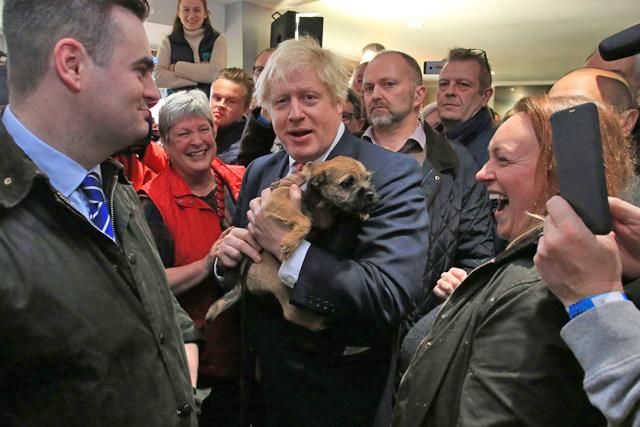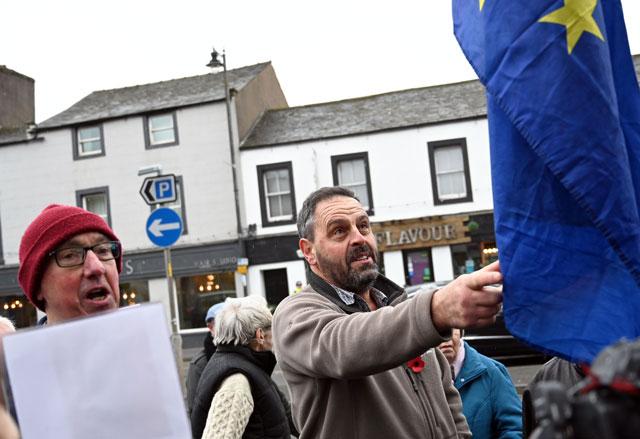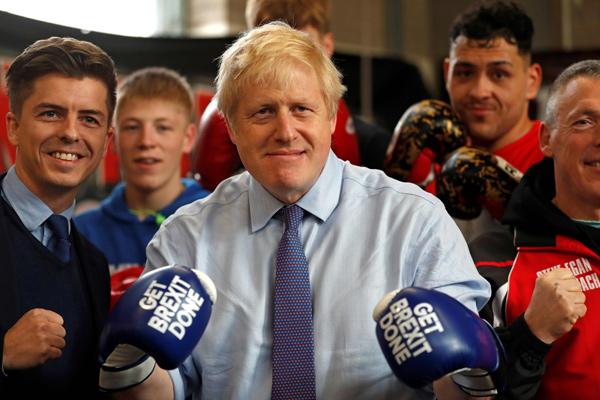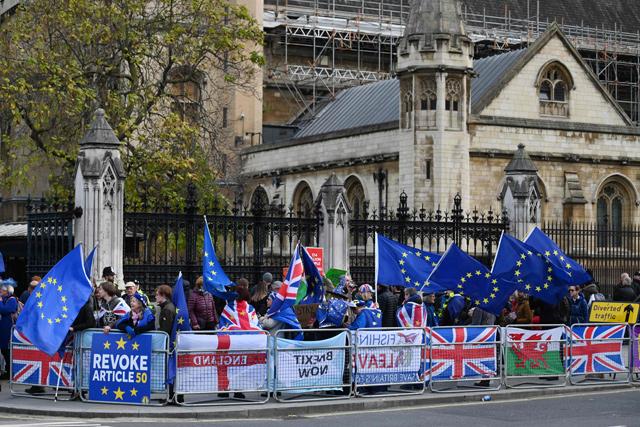You are here
First stop, Brexit: UK’s Johnson gets down to work
By AFP - Dec 16,2019 - Last updated at Dec 16,2019

Britain's Prime Minister Boris Johnson holds a supporter's dog during a visit to see newly elected Conservative Party MP for Sedgefield, Paul Howell at Sedgefield Cricket Club in County Durham, northeast England, on Saturday (AFP photo)
LONDON — Prime Minister Boris Johnson got down to work on Monday following his sweeping election victory, appointing ministers and announcing plans to publish legislation this week to get Britain out of the European Union.
The Conservative leader was expected to carry out a limited Cabinet re-shuffle before welcoming new MPs to parliament following his landslide win in Thursday's general election.
But his main focus is on fulfilling his promise to get Britain out of the European Union by the end of next month after years of acrimonious debate in parliament and across the nation.
Johnson will present legislation on Friday that begins the process of ratifying the divorce terms he struck with Brussels in October, his spokesman said.
"The government has just been elected with a clear majority to deliver Brexit, and we're focused on passing the legislation to ensure that happens by January 31," he said.
Johnson's simple promise to "get Brexit done" resonated in a snap election Thursday that for many became a re-run of Britain's 2016 EU membership referendum.
A narrow majority had opted to leave the EU back then but was followed by years of debate in parliament over how — or even when — Britain should end almost five decades of integration with its closest neighbours.
Johnson declared the argument settled when his Conservatives won 44 per cent of the vote on Thursday, giving it a majority of 80 in the 650-seat Commons — its biggest since the heyday of Margaret Thatcher in the 1980s.
The main opposition Labour Party meanwhile was relegated to its worst defeat since before World War II, forcing leader Jeremy Corbyn to announce a plan for his departure.
Canada-style deal
Johnson is only expected to tinker around the edges of his current government and conduct a real overhaul once the first stage of Brexit is safely out of the way.
London and Brussels will then have to embark on yet more negotiations aimed at striking new trade and security partnership.
The withdrawal deal sets out a post-Brexit transition period until the end of 2020 to hold these talks, during which time UK-EU ties will remain broadly the same.
London has the option to extend the transition but Johnson has insisted this will not happen, saying it is time to break free of EU rules.
His spokesman repeated on Monday that he would be seeking a "Canada-style free trade agreement", similar to the recent deal signed between the EU and Canada.
But EU officials caution that trade deals can take years, and experts warn that failure to reach agreement before the transition ends could lead to a severe economic shock.
Locking in Labour votes
Johnson will later on Monday welcome the 109 newly-elected Conservative MPs to parliament, ahead of the formal swearing-in ceremony that begins on Tuesday.
The Tories won the election by taking a swathe of northern English and Welsh seats from the Labour Party, reshaping the political landscape.
One new MP, Aaron Bell, who won in the north-eastern English seat of Newcastle-under-Lyme, tweeted a picture of himself opposite Westminster.
"A new dawn has broken, has it not?" he wrote. The Labour Party's Tony Blair said the same phrase when he won a landslide election victory in 1997.
On Thursday, Queen Elizabeth II will read out Johnson's legislative programme in a ceremony in parliament, setting out his government's priorities.
Aside from Brexit, it is expected to focus heavily on social spending aimed at locking in the future votes of traditional Labour supporters who switched sides.
After nine years of Conservative governments focused on cutting public spending, Johnson has promised more money for schools, hospitals, police and infrastructure.
This blunted the impact of Labour's own warnings about further Tory cuts to services, particularly the much-loved state-run National Health Service.
Labour meanwhile has spent the last few days arguing over what went wrong, blaming everything from Brexit, to Corbyn's left-wing views, to the right-wing print media.
Related Articles
WORKINGTON, United Kingdom — Hot on the heels of Mondeo Man and Worcester Woman comes Workington Man — the swing voter who British Prime Min
LONDON — Britain's Boris Johnson and Labour leader Jeremy Corbyn go head-to-head on Tuesday in their first TV debate of the election campaig
LONDON — Britain's political leaders tested their election pitches on Wednesday after parliament backed Prime Minister Boris Johnson's bid f


















